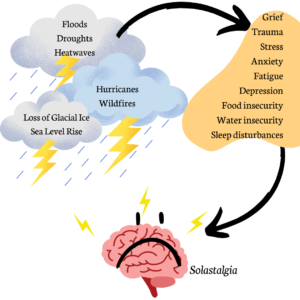Have you ever thought about how climate change affects mental health? This global issue can directly impact our mental well-being as it falls under the environmental category out of the eight psychological dimensions of wellness (Stoewen, 2017). Our places of work, school, and leisure affect our mental health, all of which make up our home on planet Earth (Harvey et al., 2017) (Schulte-Körne, 2016). The long-term changes in the average temperature and rainfall on Earth are called climate change, and these have far-reaching effects that impact both the physical and emotional factors determining our mental well-being (Braithwaite et al., 2019).
‘It’s Raining Cats and Dogs’ – Again?
Climate change leads to many shifts in our usual weather patterns that have severe impacts on our world. Unpredictable or extreme weather, loss of ice thickness, changes in wildlife populations, and even altered animal behavior are all transformations that contribute to mental health challenges, making it difficult for many to adapt and cope (NOAA, 2021).
The Impact on Clients
The side effects of climate change on our mental health are multifaceted and extensive, often leading to a state of ‘Solastalgia,’ a term coined by Albrecht in 2005 to describe the distress felt by changes in one’s home environment. A 2022 paper Crane et. al, showed that up to 50% of people who have experienced extreme weather phenomena also experience harmful mental health symptoms that significantly affect their quality of life. In essence, the overall loss of daily routines, access to nature, property, food, water, and even animal and human life often leads to many well known mental problems and even neo-psychological conditions including:
Anxiety and Eco-Anxiety: Constant exposure to news about climate change and witnessing its impact can cause general anxiety, with nearly 25% of Canadian adults reporting that they are “really anxious about it” (Abacus Data, 2019).But a specific form of anxiety, called eco-anxiety has also developed. Eco-anxiety encompasses the chronic fear of environmental doom and the feelings of helplessness about the Earth’s future (Albrecht, 2011). Although it is a relatively new term, it can manifest in familiar ways, such as persistent worries, feelings of helplessness, insomnia, and headaches (Monsell et al., 2021). Notably, a 2021 survey of 10,000 people aged 16-25 in 10 countries showed that nearly 60% of respondents were highly worried about climate change, and more than 45% said it affected their daily lives (Stoewen, 2017).
Depression: The destruction of homes, communities, roadways, and our usual way of life can lead to chronic depression, with studies showing that up to 33% of those who experienced a climate-related disaster have symptoms of depression (Crane et al., 2022).
Trauma: Being a survivor of an extreme weather event like hurricanes, floods or wildfires could lead to significant trauma. Trauma responses like avoidance, guilt, rumination, hypervigilance, flashbacks and nightmares encompass the condition called Post Traumatic Stress Disorder (PTSD), which has been estimated to be present in up to 40% of survivors of extreme weather(Crane et al., 2022).
Substance Misuse: To cope with the stress, anxiety, and trauma from these climate change events, many turn to substances. A report showed a direct relationship between the increase in heat waves with an increase in hospitalizations due to drug use by 62%. This makes mental health problems worse and creates an infinite loop of issues for individuals(Crane et al., 2022).
Sleep Disturbances: Some individuals lose their homes and regular sleeping environments, experiencing physical disruptions in their sleep patterns. Other negative outcomes associated with the acute consequences of climate change include heightened anxiety, acute stress reactions, and resulting sleep disruption. Of note, a large 2017 study by Obradovich et al showed that A 1°C increase in monthly nighttime temperatures results in three additional nights of insufficient sleep per 100 people (Rifkin et al., 2018).
Suicidality: In 2022, researchers found that for every 1°C increase in monthly temperature, there was a 0.7% and 3.1% increase in suicide rates in the United States and Mexico, respectively. This highlights the significant mental health risks associated with climate change (Crane et al., 2022).

The Impact on Mental Health Providers
Mental health providers sit on the front lines and help clients navigate the impact of climate change, but they are not immune to effects themselves, facing their own set of challenges including increased Demand and service strain. As more people experience eco-related mental disorders, the demand for mental health services increases. For example, a 2019 survey of 2,000 Canadian adults showed that 49% were increasingly worried about climate change (Abacus Data, 2019) Moreover, in Canada, almost 1 in 5 individuals aged 12 and older reported needing mental health support, with 45% indicating their needs were unmet or partially met (StatCan, 2021).
Be Prepared to Support People
To deal with climate-related challenges, there are four essential steps which can help mental health providers can use to navigate eco-related mental health burdens:
- Preparation and Awareness: Educate your clients on current weather events, maybe in the form of email or newsletters from reputable sources. Speak to them about developing emergency plans and ensuring they are aware of the increased anxiety and stress that comes with climate related events.
- Mitigation and Prevention: Reducing the impact of climate events involves improving infrastructure at your place of work, providers must adopt sustainable practices and adapt with the ever changing climate. For example, after a major hurricane in 2017 caused flooding in my practice, we switched to electronic medical records and integrated telehealth services during the COVID-19 pandemic (indirect results of climate change(Marazziti et al., 2024)). These changes have made our practice more resilient and sustainable.
- Response and Management: Quickly acting during climate events is crucial and as a mental health provider, one must execute emergency plans, offer immediate support, and manage resources efficiently. Using telehealth ensures care continues despite compromised infrastructure where possible and optimising appointment schedules while integrating community resources can also effectively support patients (Rahimi-Ardabili et al., 2022).
- Recovery and Evaluation: This comes after the climate event where the focus shifts to recovery and rebuilding. Mental health providers need to assess the impact and make the correct diagnoses. Then provide support to affected individuals whether it be through their practice alone or with the help of other providers and the community. After evaluating their response effectiveness they can do quality checks to improve future preparedness and resilience (Monsell et al., 2021).
Stay tuned for our next article in our series on climate change and mental health where we discuss strategies for coping with Wildfires among first nations…

